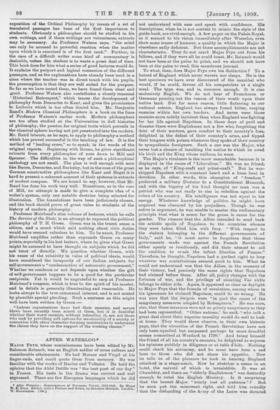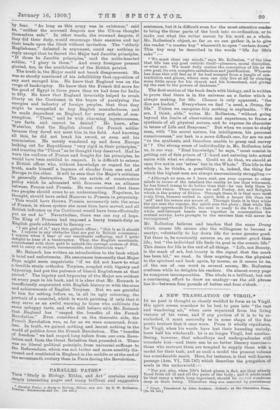AFTER WATERLOO.*
MAJOR FRYE, whose reminiscences have been edited by Mr. Salomon Reinaeh, was an English soldier of some culture and considerable attainments. He had Horace and Virgil at his finger-ends, and could quote them from memory. He was familiar with the works of Racine and Voltaire. He held the opinion that the Abbe Delille was "the beet poet of our day" in France. His taste in the drama was correct and well expressed. There are few European languages which he did * Aftor Watar100 ReMiniStlettCdS of Ritropoon Travei. 18104819. By Major W. E. Frye. Edited, with a Preface and Notes, by Solomon Retouch. London : W. Henonoluns, flOs.]
not understand with ease and speak with confidence. His descriptions, when he is not content to mimic) the style of the guide-book, are vivid enough. A. few pages on the Palais Royal, as it seemed to his vision immediately after Waterloo, even show some traces of humour, a quality in which the Major is elsewhere sadly deficient. But these accomplishments are nob characteristic. They do not mark Major Frye out from his fellows, and if they were all he could boast, Mr. Reineoli would not have been at the pains to print, and we should net have been at the pains to read, this monstrous journal.
To what, then, does Major Frye owe his distinction ? To a hatred of England which never wavers nor sleeps. He is the best specimen we have ever discovered of the cannibal who would, if be could, devour all his compatriots at a single meal. The type was, and is, common enough. It is also exclusively English. We do not hear of Frenchmen or Germans pouring out the venom of their wrath upon their native land. But for some reason, little flattering to our national esteem, England lute always found bitter, rasping enemies within her own borders. And never were those enemies more noisily insistent than when England was fighting for her life against Napoleon. In those days of peril and disaster there were Englishmen not a few who, forgetting the debt of their nurture, gave comfort to their country's foes, delighted in the defeat of their country's arms, and tipped their tongues with poison whenever they spoke of their country to sympathetic foreigners. Such a one was the Major, who never lost a chance of insulting the nation to which he owed his birth and the King whose uniform he wore.
The Major's virulence is the more remarkable because it is displayed in the cause of "Liberalism." He was no friend, as he says, of "King-craft and priest-craft." But he wore shipped Napoleon with a constant heart and a knee bent in devotion. In other words, this champion of " freedom " preferred a military Dictator to a Constitutional Monarch, and with the bigotry of his kind thought no man was a patriot who was not ready to rise in rebellion against the rulers of his country. His intelligence was not equal to his energy. Whatever knowledge of politics he might have acquired was obscured by his prejudices. Though ho was active in argument, he was unable to master the rudimentary principle that what is sauce for the goose is sauce for the gander. The rumour that the Allies intended to send back the artistic spoils of Napoleon to the countries whence they were taken filled him with fury. "With respect to the statues belonging to the different governments of Italy," said he, "it must never be forgotten that those governments made war against the French Revolution either openly or insidiously, and did their utmost to aid the coalition to crush the infant liberties of France." Therefore, he thought, Napoleon had a perfect right to levy whatever war contributions seemed good to him. What he could not understand was that the Allies, in the moment of their victory, had precisely the same rights that Napoleon had claimed before them. After all, policy changes with the fortunes of war, and the privilege of shouting Vas victis belongs to either side. Again, it appeared as clear as daylight to Major Frye that the friends of revolution, among whom in his ignorance he claimed Napoleon, could do no wreng. He was sure that the emigres were "in part the cause of the sanguinary measures adopted by Robespierre." He was sure, also, that those measures were not so grimly sanguinary as they had been represented. "Other nations," he said, "who talk a great deal about their superior morality would do well to look at home. They would there observe, in their own historic page, that the atrocities of the French Revolution have not only been equalled but surpassed perhaps by more dreadful scenes committed at Wexford in 179S:" And being himself the friend of all his country's enemies, ho delighted to express his opinions publicly in diligence or at table d'hiitc. Nothing could cheek his acrimony, and he must have been a sad bore to those who did not share his appetite. Now be tells us of the pleasure he took in hearing England attacked in a stage-coach. Now he ketches a scene in an hotel, the naiveté of which is irresistible. It was at Chambery, and there an "elderly Englishman" was dastardly
enough to extol the English Ministry. Is it surprising that the honest Major "nearly lost all patience" ? But be soon put the miscreant righb, and told him roundly that the :disbanding of the Army of the Loire was dictated
by fear. "As long as this army was in existence," said he, "neither the crowned despots nor the Ultras thought themselves safe." In other words, the crowned despots, if
they did their duty, would encourage their enemies and lay their heads upon the block without invitation. The "elderly,
Englishman," defeated in argument, could say nothing in reply except that he feared the Mijor had Jacobin principles. "If those be Jacobin principles," said the noble-hearted soldier, "I glory in them." And every foreigner present gloried, too, in the annihilation of the British patriot.
The truth is, the Major could not brook disagreement. He was so stoutly convinced of his infallibility that opposition of any sort enraged him. He knew that England was on the verge of bankruptcy. He knew that the French did more for the good of Egypt in three years than we had done for India in fifty. He knew that England invariably helped to crush liberty on the Continent in the hopes of paralysing the energies and industry of foreign peoples, that thus they might be compelled to buy English manufactures, and be made dependent on England for every article of . con- sumption. "These," said he with charming ingenuousness, "are facts, and cannot be denied." He knew, after Waterloo, that the English abused the French soldier because they dared not meet him in the field. And knowing all this, he did not break his sword, or even sell his commission. He merely wandered up and down Europe looking out for Republicans "very rigid in their principles," and treating the "Ultras" as he thought they deserved. Had he worn the uniform of France and fought for his principles, he would have been entitled to respect. It is difficult to esteem a British officer who, without knowledge or regard for the truth, made himself a bagman of slander from one end of
Europe to the other. It will be seen that the Major's criticism is generally destructive. The one article of constructive
policy which he advocated with firmness was an ,alliance between France and Prussia. He was convinced that these two peoples should come to an understanding. Napoleon, lie thought, should have ceded Hanover to Prussia in perpetuity. ," This would have thrown Prussia necessarily into the arms of France, in whose system she must than have moved, and all British influence on the Continent would have been effectually put an end to." Nevertheless, there was one ray of hope. The King of Prussia had imposed a heavy transit-duty on
English goods addressed to Saxony :—
"I arri glad of it," says this gallant officer ; "this is as it should be. I'rejoine in any obstacles that are put to British commerce ; 'I rejoice when I hear of our merchants suffering, and I quite delight to hear of a bankruptcy. They, the English merchants, contributed with their gold to uphold the corrupt system of Pitt, and to carry on unjust, unreasonable, and liberticide wars."
Mr. Reinach has written an introduction to the book which , is brief and unfortunate. He announces innocently that Major Frye might seem unpatriotic "if we did not know to what ,a terrible strain orthodox Toryism, coupled with bigotry and hypocrisy, had put the patience of liberal Englishmen at that Period." The bigotry and hypocrisy of the Major are evident on every page in his book, and it is clear that Mr. Reinach is insufficiently acquainted with English history-or with the aims and achievements of English Toryism. But we are grateful to him for setting before us, in all its ugly colouring, the Portrait of a cannibal, which is worth painting if only that it may serve as an awful warning to those who cultivate the same unhappy taste, and who. still believe with Mr. Reinach that England has "reaped the benefits of the French Revolution." Even considered on the theoretic side, the French Revolution was, as far as we were concerned, fruit- less. In truth, we gained nothing and Iearnt nothing in the woad ef politics from the French Revolution. The "benefits of freedom" we had reaped long before from our own Revo-
lution and from the Great Rebellion that preceded it. There was no liberal political principle, from universal suffrage to
the Referendum, which was not better and more sensibly dis- cussed and ventilated in England in the middle or at the end of
the seventeenth century than in Paris during the Revolution.





































 Previous page
Previous page